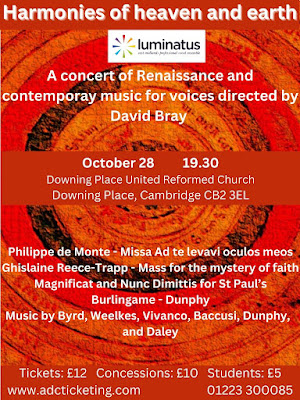 |
| Takács String Quartet (Photo: Amanda Tipton) |
Cambridge Music Festival's autumn concert series (Sunday 17 October to Wednesday 15 November 2023) offers a carefully curated programme of exceptional and unusual performances showcasing everything from traditional Syrian music to classical and early music with performances taking place in some of Cambridge's most historic venues such as King's College Chapel and Trinity College Chapel.
"In a city with so much music-making, Cambridge Music Festival stands apart for the exceptional quality and variety it brings" enthused festival director, Justin Lee. "Variety that takes one from JS Bach to Judith Weir and, indeed, to Syrian traditional music performed by a wide range of world-acclaimed artists including the Takács String Quartet, Angela Hewitt, the BBC Singers, the Philharmonia Orchestra and Maya Youssef."
This year's 'opener' falls to the Takács String Quartet (Sunday 17 October at West Road Concert Hall) playing Haydn's String Quartet, Op.71 No.2 and Beethoven's Razumovsky Quartet. They'll also present a commissioned piece by Stephen Hough demonstrating the festival's commitment to innovation and new creations. And on Friday 3 November at King's College Chapel, the choirs of King's College and New College Oxford join forces with the Philharmonia Orchestra to perform Haydn's choral masterpiece The Creation under the baton of Daniel Hyde.
A significant tribute to Sir John Tavener can be enjoyed on Friday 10 November at King's College Chapel (being recorded for broadcasting on BBC Radio 3) featuring the BBC Singers, cellist Natalie Clein and organist Paul Greally. They'll explore Tavener's profound works commemorating the composer's legacy on the tenth anniversary of his death while virtuoso pianist, Angela Hewitt, will perform JS Bach's iconic Goldberg Variations at Trinity College Chapel on Monday 13 November.
Sharing her sense of belonging through her spellbinding music, Quanun player/composer, Maya Youssef, [whom Robert interviewed in May this year] will be joined by a small ensemble in what promises a marvellous and interesting concert at the Old Divinity School of St John's College on Wednesday 15 November. By using the delicate and mystical sound of the quanun (Arabic zither) she'll create a sound world that stems from Middle Eastern traditions but encompasses styles including that of jazz and flamenco.
 |
| Maya Youssef (Photo Igor Studio) |
Jumping ahead to next year, the February spring series offers more extraordinary performances by the likes of pianist Stephen Hough, early music ensemble Arcangelo, 12 Ensemble, master sitarist Jasdeep Singh Degun, the acclaimed American Bugallo-Williams piano duo and vocal ensemble Tenebrae. Furthermore, a unique installation arrives in Cambridge during February half-term inviting members of the public to experience the Philharmonia Orchestra's virtual reality orchestra.
And in celebration of the festival's 30th anniversary, nine stunning new films have been commissioned in collaboration with percussionist Joby Burgess featuring new music from such luminous creatives as Gabriel Prokofiev, Dario Marianelli, Graham Fitkin, Dobrinka Tabakova, John Metcalfe, Yazz Ahmed and Tunde Jegede.
Other highlights of the festival's special (and festive) anniversary season include performances from Sheku and Isata Kanneh-Mason, London Mozart Players, pianist Stephen Hough, harpsichordist Mahan Esfahani, the Takács String Quartet and Chineke! Chamber Ensemble as well as two Cambridge institutions - the Choir of King's College Cambridge and the Academy of Ancient Music.
Founded in 1991, the current director of the Cambridge Music Festival, Justin Lee, has been in post since 2012 and under his leadership, the festival has featured an array of leading artists ranging from Murray Perahia to Nigel Kennedy and from the Philip Glass Ensemble to the Borodin String Quartet in orchestral, choral and chamber-music concerts running alongside a well-planned programme of education and community events.
As the Cambridge Music Festival receives no public subsidy or Arts Council support whatsoever, a generous and dedicated core of sponsors and individual donors regularly come to the rescue by providing at least 70 per cent of the festival's income. This feat alone needs to be loudly applauded. Bravo!
As an aside, a couple of artists appearing at the festival this year, Mahan Esfahani and Angela Hewitt, have just released their latest recordings on the Hyperion label, a lively, independent and forward-thinking British classical label devoted to presenting high-quality recordings of music of all styles and from all periods ranging from the 12th to the 21st century.
The first and only harpsichordist to be a BBC New Generation Artist (2008-10), Esfahani's recording of JS Bach's French Suites are simply sublime and prospective listeners to this wonderful new set should be rest assured that any hint of the routine remains as distant a threat as ever. [Buy Mahan Esfahani's Bach: The French Suites from Amazon].
On the other hand, Hewitt sensitively captures so well the distinctive writing and detail of Mozart's Piano Sonatas K310-311 and K330-333 [Buy Angela Hewitt's Mozart Sonatas from Amazon]. Her voyage of discovery through these wonderful pieces are so engaging and such a joy to hear offering the listener vital and alert accounts of the works in question while respecting their scale and sensibility and, indeed, revealing the influences of Mozart's orchestral and concerto writing of the period.
Online booking: https://cambridgemusicfestival.co.uk/
info@cambridgemusicfestival.co.uk












.jpg)

.jpeg)





.jpeg)